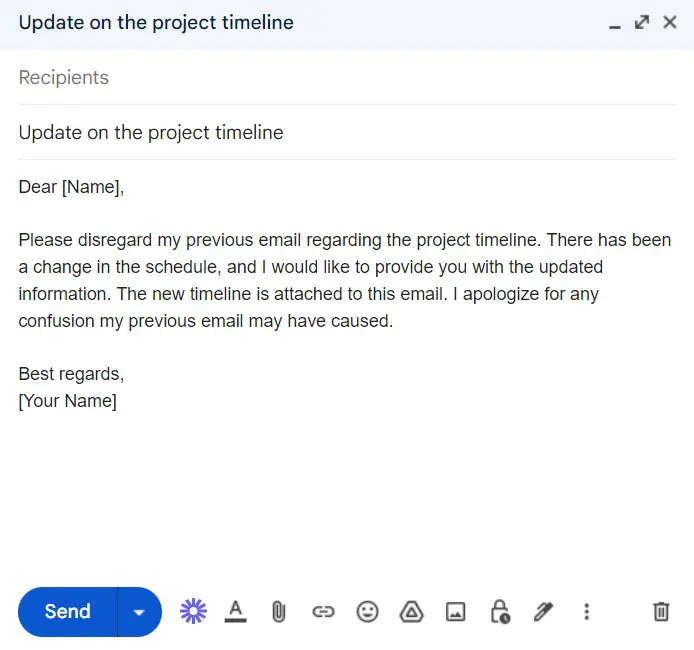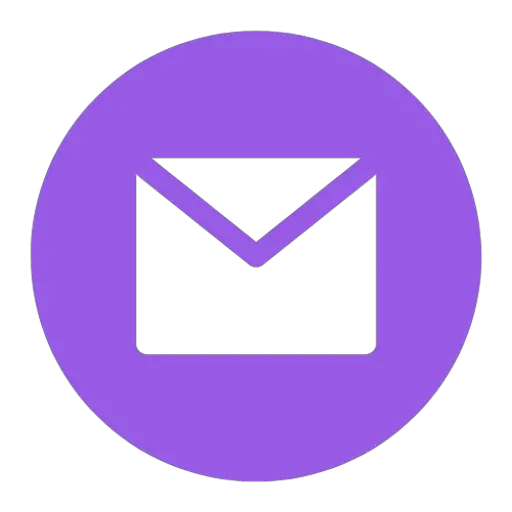Have you ever sent an email and then immediately realized there was a mistake or something you would like to change? Or perhaps you received a response that made your original message irrelevant?
In situations like these, it can be challenging to know how to proceed without causing confusion or frustration for both parties involved.
Fortunately, there is a simple and effective solution: using the phrase “Please Disregard My Previous Email.”
By acknowledging the mistake and providing clarification or updated information, you can avoid confusion and maintain clear communication with your colleagues and clients.
In this article, we will discuss how to use this phrase in an email, including when to use it and provide you with some practical email examples.
We will also explore alternative ways to communicate the same message effectively.
Contents
- How to Use the Phrase “Please Disregard My Previous Email”
- “Please Disregard My Previous Email” Example Emails
- Example 1 – Subject: Update on the project timeline
- Example 2 – Subject: Correction to the sales report
- Example 3 – Subject: Change of venue for the conference
- Example 4 – Subject: Updated Meeting Time
- Example 5 – Subject: Correction to the Proposal
- Example 6 – Subject: Update to the Agenda
- Example 7 – Subject: Change of Plans
- Example 8 – Subject: Correction to the Budget
- Example 9 – Subject: Change of Contact Information
- Example 10 – Subject: Change of Date for the Training Session
- Alternative Ways to Say “Please Disregard My Previous Email”
How to Use the Phrase “Please Disregard My Previous Email”
The phrase “Please Disregard My Previous Email” is a polite and straightforward way to inform the recipient that the previous message is no longer valid or relevant. You should use this phrase when you have made a mistake, provided incorrect information, or received new information that changes the context of the previous message.
When using this phrase, it’s important to provide a brief explanation of why the previous email is no longer valid. This clarification will help the recipient understand why they should ignore the previous message.
Now that we’ve covered the basics let’s move onto some practical examples.
“Please Disregard My Previous Email” Example Emails
Example 1 – Subject: Update on the project timeline
Dear [Name],
Please disregard my previous email regarding the project timeline. There has been a change in the schedule, and I would like to provide you with the updated information. The new timeline is attached to this email. I apologize for any confusion my previous email may have caused.
Best regards,
[Your Name]
Example 2 – Subject: Correction to the sales report
Dear [Name],
Please disregard my previous email regarding the sales report. I made an error in the calculation of the revenue, and I have attached the correct report to this email. Thank you for your understanding.
Best regards,
[Your Name]
Example 3 – Subject: Change of venue for the conference
Dear [Name],
Please disregard my previous email regarding the venue for the upcoming conference. Due to unforeseen circumstances, we have had to change the location, and I wanted to provide you with the updated information. The conference will now take place at [insert new location], and I have attached the updated agenda to this email. Please let me know if you have any questions.
Best regards,
[Your Name]
Example 4 – Subject: Updated Meeting Time
Dear [Name],
Please disregard my previous email regarding the meeting time. I apologize for any confusion that may have caused, but we have had to adjust the schedule. The new meeting time is [insert time and date]. Please let me know if this works for you.
Best regards,
[Your Name]
Example 5 – Subject: Correction to the Proposal
Dear [Name],
Please disregard my previous email with the proposal. There was an error in the pricing table that I attached, and I have attached the correct proposal to this email. Thank you for bringing it to my attention.
Best regards,
[Your Name]
Example 6 – Subject: Update to the Agenda
Dear [Name],
Please disregard my previous email regarding the agenda for the meeting. There has been a change in the schedule, and I wanted to provide you with the updated information. The new agenda is attached to this email. Thank you for your understanding.
Best regards,
[Your Name]
Example 7 – Subject: Change of Plans
Dear [Name],
Please disregard my previous email regarding our plans for next week. Due to unforeseen circumstances, we have had to adjust our schedule. I apologize for any inconvenience this may have caused. I will follow up with you shortly to discuss our new plans.
Best regards,
[Your Name]
Example 8 – Subject: Correction to the Budget
Dear [Name],
Please disregard my previous email regarding the budget. There was an error in the figures that I provided, and I have attached the correct budget to this email. Thank you for your understanding.
Best regards,
[Your Name]
Example 9 – Subject: Change of Contact Information
Dear [Name],
Please disregard my previous email with my contact information. I realized that I provided the wrong phone number and email address. Here are my correct contact details:
Phone: [insert phone number]
Email: [insert email address]
I apologize for any confusion this may have caused.
Best regards,
[Your Name]
Example 10 – Subject: Change of Date for the Training Session
Dear [Name],
Please disregard my previous email regarding the training session. We have had to adjust the date due to unforeseen circumstances. The new date is [insert new date], and I have attached the updated agenda to this email. Thank you for your understanding.
Best regards,
[Your Name]
Alternative Ways to Say “Please Disregard My Previous Email”
While “Please Disregard My Previous Email” is a clear and straightforward way to communicate that the previous message is no longer valid, there are alternative phrases that you can use, depending on the context.
Here are some examples:
- I apologize for any confusion caused by my previous email. Please ignore that message.
- Please disregard my previous email. I have updated information that I would like to share with you.
- I made a mistake in my previous email. Please disregard it and refer to this updated message instead.
- My previous email contained incorrect information. Please disregard it and use this corrected version instead.
- There has been a change in the situation since my previous email. Please disregard that message and refer to this updated information.
In summary, using the phrase “Please Disregard My Previous Email” is a simple and effective way to maintain clear communication in professional settings.
When using this phrase, make sure to provide a brief explanation of why the previous email is no longer valid.
Additionally, alternative phrases can also be used depending on the context.
We hope these practical examples will help you navigate those situations where you need to update or correct an email message.
Remember to keep your language clear and concise, and don’t hesitate to use these phrases whenever necessary.


